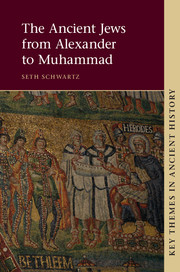Book contents
7 - Jews in the ancient world
Published online by Cambridge University Press: 05 June 2014
Summary
The primary reason to study ancient Jewish history and texts is interest in ancient Jewish history and texts. There is enough material, and it is distinctive and rich enough to sustain plenty of attention. Complicating and enriching such interest for many people is the fact that the history and the texts continue to make claims and demands: they are, even today, not completely ‘other’. Indeed, defamiliarizing the material, restoring it to antiquity, and, thereby, subjecting contemporary proprietary claims over it to intense and precise analytic scrutiny, retain a measure of ethical and political urgency.
But there are other reasons to study ancient Jewish history, too, and one of the implicit themes of this book has been that ancient historians in particular can ill-afford to ignore it (cf. Goodman and Alexander 2010). Jewish and Christian literary traditions preserved much material relevant to ancient historians’ concerns: parts of the Hebrew Bible and much of the so-called Apocrypha and Pseudepigrapha are primary evidence for Hellenistic culture; Philo and Josephus – not to mention the New Testament – are important samples of Early Imperial Greek writing, however far they may deviate from the literary standards of the classical canon; Palestinian rabbinic literature in all its occasional hermeticism is the largest corpus of writing produced by the inhabitants of a single High and Later Imperial Roman province except for Italy (perhaps Asia produced more, but all of it, pagan and Christian, participates in trans-local cultural patterns). That so few ancient historians have embraced this material testifies to the continuing, albeit sometimes vestigial, conception of the field of ancient history as ancillary to classics.
- Type
- Chapter
- Information
- The Ancient Jews from Alexander to Muhammad , pp. 152 - 155Publisher: Cambridge University PressPrint publication year: 2014

